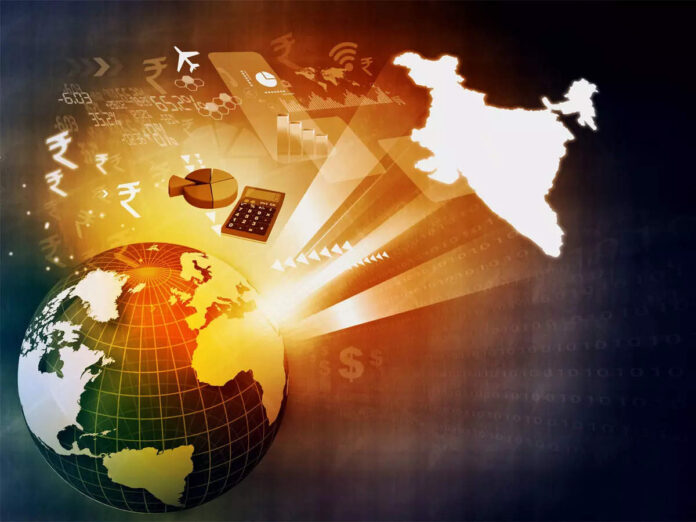The Russia-Ukraine war, now in its eighth month, shows no sign of ending. It has entered a new phase with Russia annexing the regions of Donbas and Luhansk. Putin has ordered a mobilisation of citizens to get fresh recruits to fight the war. He has given implicit warnings about the possible use of nuclear weapons if need be. The US and Europe have stepped up their arms supplies to Ukraine. Fresh rounds of sanctions on Russia have been announced.
By Arvind Gupta
The geopolitical implications of the war have been huge. Coming on top of a debilitating once-in-a-century pandemic, the global economy is slowing down.
The world has seen an unprecedented crisis in fuel, food and fertiliser prices leading to an unprecedented cost-of-living crisis on a global scale. The seriousness of the crisis is reflected in the fact that the number of people living in extreme poverty has increased.
High inflation has risen as a global concern. The current global inflation rate is around nine percent as compared to about 2 percent in pre pandemic year. In US inflation reached 9.1 percent in June 2022. In Euro area inflation in September was around 10 percent. Many counties are experiencing high double digit and even triple digit inflation. In Turkey inflation is raging at 80 percent, Sri Lanka 64 percent, Argentina 78 percent, Russia 14 percent, and Ukraine23 percent. China (2.7 percent) and Japan (3 percent) are the two major economies where inflation is still low.
To fight inflation, the central banks are aggressively reversing the monetary policies from accommodative to restrictive. The US Fed expects to raise its target rate to around 4.4% by the end of 2022, up from the current range of 3 to 3.25 percent. The expectation is that current aggressive monetary stance will help achieve 2 percent inflation target by 2025. The US economy has slowed down to 0.2 percent in 2022 and might enter a phase of recession.
The European Central Bank raised the three key ECB interest rates by 75 basis points in September. According to projections, the European economic growth is likely to stagnate later in the year or by first quarter of 2023.
Economists argue that the mere raising of interest rates will not help bring down inflation. There also must be ‘demand destruction’ simultaneously. But reducing demand will lead to an economic slowdown. The policymakers are facing an acute dilemma.
To make matters worse, OPEC plus group has decided to cut the daily crude oil production by 2 million barrels per day which equals about 2 percent of global oil supply. The decision has been justified as a “response to rising global interest rates and a weakening world economy”. The OPEC plus move is political in nature. The US has described the move as ‘shortsighted’. The production cut will lead to an increase in oil prices which had started coming down in the last few months. Increased oil prices will weaken the global economy further.
The dollar has continued its relentless upward march against most currencies and is becoming unaffordable for many countries. The decline in a currency vis-a-vis will make imports more expensive, which will fuel inflation further. The rise in dollar has caused turmoil in the global bond market. Repayment of dollar denominated debts will become increasingly onerous. Many indebted countries are under severe stress. Debt repayment defaults will become more common.
The latest warning shot has been fired by the IMF managing director Kristalina Georgieva at a speech at Georgetown University on 6 October. She flagged the risk of impeding global recession. IMF estimates that counties accounting for a third of the world economy will experience at least “two consecutive quarters of contraction this or next year”. The global economic growth, according to IMF estimates, is likely to be 3.2 percent for 2022 and 2.9 percent for 2023. The World Bank has also rung the alarm bells on global slowdown, increased poverty and a fall in median incomes. Covid pushed 77 million additional people into extreme poverty. The World Bank has warned that per capita incomes in developing countries have stagnated.
Nature has also begun to show its displeasure. Extreme weather events have multiplied. This year we have seen unprecedented heat waves, floods and droughts in several parts of the world. This has led to damage to infrastructure and migrations and disease. Climate events have deepened many ongoing conflicts; addressing climate change has to be a part of new economic policies aimed at recovery and growth. World Bank is allocating significant sums for sustaining climate finance.
In short, the world is facing a ‘perfect storm’ of multiple crises – Covid, war and climate resulting in geopolitical, food, health and climate crises. Policymakers are struggling to find adequate response. IMF and World Bank are having a joint meeting of stake holders from October 10 to 16th to discuss what can be done to deal with overlapping crises.
India
India will take over the presidency of the G20 when the global economy faces the ‘darkening cloud’ of a sharp economic down turn. The G20 economies, constituting about 80 percent of global GDP, have a special responsibility to coordinate their policy responses. The crisis this time is much bigger than the 2008 global financial and economic crisis. India must take the lead in speaking on behalf of the developing countries. India’s own responses will be closely scrutinized by the international community.
There is a general feeling in India that we have weathered the storm well. India is likely to register 7 percent GDP growth in 2022-23. The inflation at around 7 percent is moderate by global standards and only marginally higher than RBI’s limit of 6 percent. Tax collections have been buoyant. Forex reserves are still comfortable and are a significant cushion to weather the future shocks.
Yet, there are worrying signs too. The rupee has fallen sharply against the dollar as the slide continues. Global down turn will impact exports which are beginning to slow down. India’s import bill has risen steeply and will rise further if oil, gas and fertiliser increase further. The growth in wheat and rice production this year is likely to be less than last year. Foreign exchange reserves have fallen sharply as RBI manages the slide in rupee vis-a-vis the dollar. To fight inflation, the RBI has steadily raised interest rates and indicated that more rate hikes are in the offing.
Global attention has also been drawn to recent restrictions India has put on the export of wheat, rice and sugar due to domestic shortages. India is a major exporter of these commodities. Global opinion is critical of India’s moves.
Options before India are limited. It has tried to mitigate the rising oil import bill by buying oil from Russia at discounted prices. But this has raised eye borrows in the West which wants Russian revenues from oil and gas exports to be whittled down.
PM Modi has reminded Present Putin publicly that this is not an ‘era of wars’. But this has had little impact on the two sides. The war must come to an end. Diplomacy is at a standstill. Putin has said he is interested in negotiations but Ukrainian President Zelensky is in no mood to oblige, after Russia’s occupation of Ukrainian territory. The western positions have hardened after Russian annexation of Donbas and Luhansk.
For the moment, the only thing India can do is to be prudent in managing its economy as far possible and wait for the headwinds to pass. There is no doubt that we are in the midst of a crisis. RBI will have to prudently manage the exchange rate without letting the forex reserves fall too steeply.
Inflation must be kept under control through a combination of monetary and fiscal policies. That other countries have higher inflation is no comfort to Indian consumers who are feeling the pinch of inflation, particularly the rise in food prices.
We need to invest more in agriculture and grow adequate food and build stocks. We need to guard against food, energy and fertiliser price shocks.
India will have to provide a safety net for the most vulnerable sections of the population, as it did during the pandemic. The recent extension of free ration scheme which covers 800 million people is a step in the right direction. But this constricts the fiscal space further. Tax buoyancy must be maintained. GST collection regime needs to be tightened further.
India cannot remain unaffected by the multiple crises which are not of its making. Future shocks should be expected. Bravado must be avoided.
The National Security Council was set up for anticipating and dealing with the multipronged crises which we are experiencing today. They should get activated. Along with NITI Aayog, NSC should draft a comprehensive action plan to deal with the crises. The government should consider setting up a multidisciplinary task force of experts who can look at emerging crises comprehensively and suggest a holistic approach to dealing with the perfect storm we are passing through. The task force model set up for Covid management was a success. There ought to be a debate in the parliament on the scale and depth of the global crisis, how it impacts the country and what needs to be done. States must also be included in crisis management.
This article first appeared in www.vifindia.org and it belongs to them.








